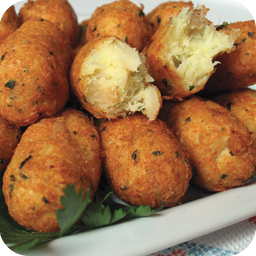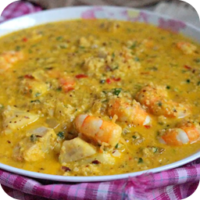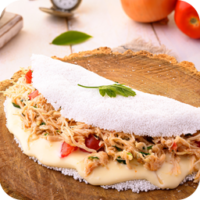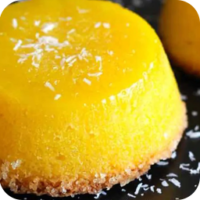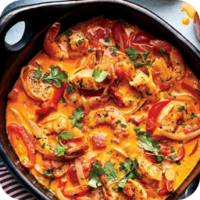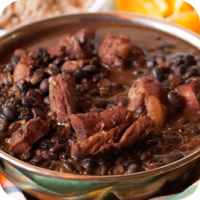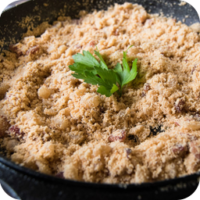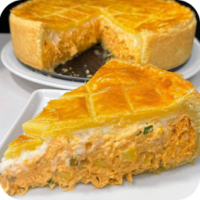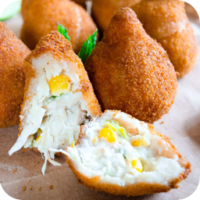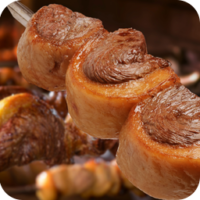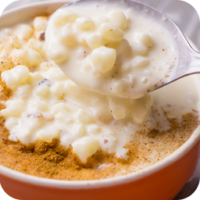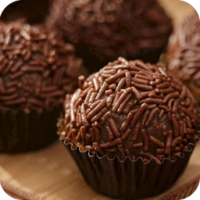Bolinhos de Bacalhau (translated as “Codfish Cakes”) are a popular Brazilian snack or appetizer made from salted codfish (bacalhau), potatoes, onions, parsley, and egg, all formed into small fritters and deep-fried until golden and crispy. This dish is often served in bars, restaurants, and during festive occasions like Christmas, Carnival, and family gatherings.
Bolinhos de Bacalhau are a part of Portuguese cuisine, and their popularity in Brazil is a result of historical Portuguese influence. Codfish was historically preserved through salting, making it a common ingredient in many Portuguese and Brazilian dishes. In Brazil, the dish is enjoyed across the country and is often paired with caipirinhas (Brazil’s national cocktail) or cold beer.
Key Features of Bolinhos de Bacalhau:
- Main Ingredients:
- Bacalhau (Salted Codfish): The star ingredient, usually rehydrated before use, and then shredded or flaked to incorporate into the batter.
- Potatoes: Cooked and mashed, potatoes serve as the base for the dough that binds the codfish together.
- Eggs: Used to help bind the ingredients and give structure to the fritters.
- Onions and Parsley: Fresh herbs and onions are added for flavor and color.
- Garlic and Seasonings: Additional seasoning like garlic, black pepper, and sometimes a bit of lemon zest or paprika are used for flavor.
- Breadcrumbs (optional): Sometimes used to help bind the ingredients together or for coating the fritters.
- Preparation:
- The salted cod is soaked in water for several hours (or overnight) to remove excess salt, then boiled and flaked into small pieces.
- The potatoes are boiled and mashed, then combined with the flaked cod, eggs, parsley, onions, and seasonings to form a dough-like mixture.
- The mixture is shaped into small balls or oval-shaped fritters.
- These fritters are then deep-fried until golden and crispy on the outside, while the inside remains soft and flavorful.
- Serving:
- Bolinhos de Bacalhau are typically served hot as a snack or appetizer.
- They are often enjoyed with dipping sauces, such as tartar sauce or hot sauce, and paired with caipirinhas or beer.
- They are commonly found at festive gatherings like Christmas, New Year’s, and Carnival celebrations.
Cultural Significance:
- Portuguese Influence: The dish has strong ties to Portuguese cuisine due to the history of codfish being salted and exported to Brazil by Portuguese colonizers. It is a beloved dish in both countries.
- Celebratory Dish: Bolinhos de Bacalhau are often prepared for festive occasions, including religious holidays like Christmas and Easter, when codfish is traditionally consumed.
- Street Food: In Brazil, they are often served in bars or as part of a happy hour menu, making them a popular choice for casual dining or social gatherings.
Variations:
- Bolinhos de Bacalhau com Queijo: Some versions include cheese in the batter for a creamy texture and richer flavor.
- Mini Bolinhos: Smaller-sized fritters are also common, served as bite-sized snacks.
- Spicy Bolinhos: Some variations may include chili or paprika for a spicy kick.
Nutritional Value:
Bolinhos de Bacalhau are typically deep-fried, which makes them higher in calories and fat. However, they are a good source of protein due to the codfish and eggs, as well as carbohydrates from the potatoes. It’s a hearty snack but should be enjoyed in moderation due to its fried nature.
Fun Fact:
- Bacalhau’s Importance: Codfish, or bacalhau, is sometimes referred to as the “king of fish” in Portuguese cuisine due to its long history and importance. In Brazil, it is most commonly associated with major holidays and celebrations, making Bolinhos de Bacalhau a symbolic dish during these times.
- Traditional Serving: While these codfish fritters are famous in Brazil, they are often eaten alongside other Brazilian treats like feijoada or churrasco.
Summary:
Bolinhos de Bacalhau are crispy, golden fritters made from salted codfish, mashed potatoes, and seasonings, deep-fried to perfection. They are a beloved Brazilian snack, often served during celebrations and as part of the country’s festive cuisine. Whether enjoyed at a party, with a drink, or during a family meal, these delicious codfish cakes reflect the blend of Portuguese and Brazilian culinary traditions.

